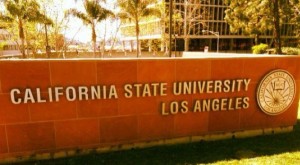
In class, we learned that a bottleneck is the longest activity that is the limiting factor in operations management. Managers want to match capacity and design while still maintaining the greatest efficiency possible.
Education is no different as it follows basic business rules. Schools increasingly want students to graduate, get jobs, and eventually donate back as alumni. Universities across the country have a problem with so called “bottleneck courses,” which prevent students from graduating. California State University (CSU) reports about 30 such courses that have a high rate of failure, including math, science, and history. Those courses distract students from their major studies and often cause failing or withdrawing, if not dropping out of college altogether.

CSU wants to address the bottleneck courses by providing science labs online and moving away from traditional in-person classes, especially for students who do not major in science. CSU does not have sufficient capacity to match demand for bottleneck classes due to limited lab space. Virtual labs are a way of offering more lab sections and thus increasing enrollment and moving more students through the system (increasing the rate of graduation).
Low cost of such classes coupled with high demand means more money the school will earn and able to re-invest. However, CSU’s solution to bottleneck science courses raises concerns over the quality of education given. In-person classes are especially important for science labs; a biology department chair at CSU, Jeffrey Bell, says, “my biggest concern, especially with freshman classes is you don’t want students seeing reality as a video game—a key thing in science is we investigate reality.”
Before we can argue about the quality of such courses, let’s ask ourselves: “what is the real value of education?” The content that is learned in science classes is available online. Therefore, the content is not the sole value of education, but rather a college experience: the ability to interact with the professor and peers on one-to-one basis. But just how important is the experience for non-science majors who just want to pass the class to graduate?

CSU’s demand far exceeds school’s effective capacity, mainly due to struggling students repeating the class. School’s solution to increase the capacity through online sections to match enrollment demand is one way of managing the problem. School could also manage demand by increasing capacity—building new science labs and hiring more professors. This long-term solution would ensure that struggling students are offered adequate in-person help, rather than let them pass without a sufficient knowledge of science.
CSU’s tactic for managing bottleneck science lab courses is rather new, thus raises concerns about its quality, especially in the time when U.S. students lag behind in science and math compared to other countries. Is removing this bottleneck sacrificing or improving the quality of science lab courses? Will this decision eventually lead to graduates who do not have sufficient knowledge of science or scientific thinking? Can you think of other solution to tackle the bottleneck course problem?

I agree that U.S. students lag behind in science and math. I believe that there are positives and negatives in removing the bottleneck courses. Positives to taking it out would be that it is easier for students to graduate. If these courses are taken out, students may lack even more knowledge in the fields of science and math. It might not lead to students have less scientific thinking because some students may not do that for their whole entire life. I believe that having these extra courses cause students to widen their range of communication.
DePaul actually tries to avoid this case by having a Degree Progress Report (DPR). It shows the courses you have taken and the courses that you will need to take in order to fulfill the requirements for that specific major. That way students will not have to worry about not fulfilling a requirement. Also, students could also visit their academic advisers to keep up to date on what they should be doing and what classes they should take.
This was a very interesting post to read. I also agree that these science and math courses can provide huge “bottleneck” problems for universities in that most students who are not majoring in these subjects don’t have much interest in doing the course work and as a result failing or dropping out of them. I personally have experience with this problem since I am currently going into my senior year when the fall semester starts and I still haven’t taken my science course yet because I am dreading taking a science course. Furthermore, it is my opinion that the online science classes would be a positive for students like myself being that we are not majoring in the subject and will not need an extensive amount of knowledge in science. Overall, I think more universities could benefit financially from providing alternative options for such “bottleneck” courses like the ones explained above.
This was a very interesting read. I liked how you tied in a management concept to a real world example. I also am in a similar situation as kbeery since I am finishing up my senior year next year and have still not taken my science lab course. Personally, I would enjoy taking an online science class to fulfill my science lab requirement. Since I am not majoring in science, I don’t think I need that quality knowledge for science. Although not everyone may be in favor of having an online science lab, I believe by providing an alternative for these requirements, both students and universities can benefit. By having a more accessible and convenient way to take a course, I believe that these “bottleneck” course solutions can be solved.
I never really thought about bottlenecks in terms of education, thanks for this post. This also shows how bottlenecks can sometimes be a good thing. I know that there are a lot of negative things about bottlenecks and why it contributes to low retention rates but I think in some instances it can be good. If you make the introductory courses to a certain topic especially hard, it would give students more realistic expectations for the challenges that may be ahead. I’m not entirely sure it is true but I heard Depaul does a similar thing for the intro to accounting courses. They are exceptionally difficult and have high fail rates, to weed out some accounting majors. If it is too challenging and not right for you, then you learn early on that it may not be the right career path. I can definitely see the pros and cons of bottlenecks.
This is an amazing post! Personally, I am not a big fan of those bottleneck course. As someone mentioned in the previous comment, Intro to Accounting was extremely difficult for me. Some of the courses that are not related to your major ruin your GPA, because you are not interested in those course. Therefore, you are not motivated to succeed.